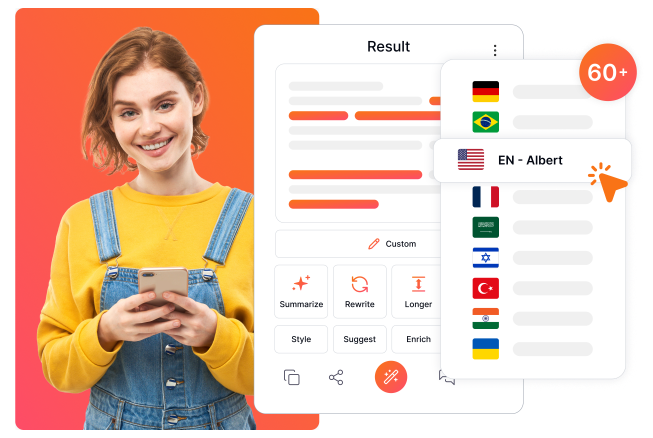The Future of AI Writing Technology Explained
The Future of AI Writing Technology Explained
Blog Article
Mastering Content with AI Editing Tools
Artificial intelligence (AI) writing technology has evolved fast over the past decade, reshaping the way we build and communicate with published content. From grammar modification resources to AI-generated books, the options appear limitless. But where exactly is this technology going? Let's discover the innovations, difficulties, and potential future of ai grammar checker.

How AI Writing Technology Works Nowadays
At its key, AI writing technology relies on Normal Language Running (NLP) and unit learning. These technologies enable designs to know, produce, and improve human language. Instruments available today excel at jobs like:
1. Content Creation
AI has achieved a point wherever it could create complete website articles, social media sayings, and also news articles. Some models can handle mimicking human publishing variations so successfully that distinguishing between AI- and human-written material has become increasingly difficult.
2. Syntax and Fashion Suggestion
AI-powered writing assistants don't just check always for grammar and spelling mistakes; additionally they give suggestions to enhance tone, understanding, and syntax, making complicated writing accessible to an extensive audience.
3. Message Examination
AI can consider the mental tone of a bit, allowing businesses to determine how their communications can resonate with readers. That is especially of use in advertising and customer interaction.
The Recent Developments in AI Writing Technology
A few styles are shaping the next period of AI-powered writing tools:
• Personalization
AI publishing engineering is increasingly capable of tailoring content to personal preferences. Models can adjust to a user's writing fashion, ensuring the output feels authentic.
• Multilingual Features
Many AI methods are expanding their international reach by offering increased translation characteristics and support for numerous languages.
• Improved Study Features
AI resources now get the capacity to analyze substantial amounts of knowledge and present fact-checked, well-researched writing in seconds, simplifying the procedure for professionals in industries like law, finance, and journalism.
What the Future Keeps for AI Publishing Technology
1. Increased Imagination
While current AI is proficient at generating content, their imagination is still restricted to patterns within its training data. Future AI is not only estimated to assist but to produce original, topical performs that concern individual imagination.
2. Easy Effort
Imagine an AI that works alongside you in real-time, finishing your sentences, doing live edits, and even brainstorming ideas. AI writing instruments may possibly shortly become co-authors, allowing creativity to movement uninterrupted.
3. Moral and Available Design
With rising problem about plagiarism, misinformation, and opinion, developers work toward more clear AI training procedures and ethical implementation. Future instruments will more than likely present more detailed details and steps to make certain accountability.
Issues and Criteria
The development of AI writing technology is not without hurdles, including:
• Ethical Problems

Who owns content developed by AI? How do we ensure AI-generated material is not spreading misinformation? These debates stay unresolved.
• Human-AI Harmony
Will AI match human imagination or totally change specific jobs? Many writers and musicians worry about their relevance in a AI-driven world.
• Accessibility Divide
Not all agencies or regions have identical access to cutting-edge AI methods, increasing issues in regards to the impact with this engineering on international inequality.
Adjusting the Way We Write
AI publishing engineering continues to be in its infancy compared to their potential. Whether you are students designing documents, a content marketer targeting unique readers, or even a novelist seeking creativity, AI tools will continue steadily to revolutionize the writing process. The next decade claims breakthroughs that mixture human ingenuity with machine intelligence, creating a potential where writing is better, available, and impactful than actually before.
Report this page